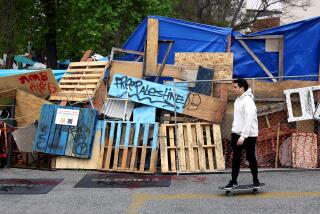COLLEGE OF THE CANYONS : Students Protest Squirrel Killing
- Share via
About 30 students walked out of their classes at College of the Canyons this week to protest the continued use of aluminum phosphide to reduce the number of ground squirrels on campus.
Wednesday’s protest was directed at the administration’s failure to effectively communicate about how the squirrels would be eliminated, protest organizer Michael Daly said.
More than 170 students signed a petition stating, among other things, that the squirrels were killed against the wishes of the student body.
The petition also said that Dianne Van Hook, college superintendent-president, failed to remain informed on the matter.
They also charged that the college administration and district Board of Trustees did not investigate ways to prevent the growth of the squirrel population.
Van Hook called Daly’s criticism of the administration “inaccurate and unfair after it spent months of looking into options concerning the squirrel problem.”
“If the students feel they have a cause, then it’s their right” to protest, said James Walker, assistant superintendent-vice president.
But he added that protesters should keep in mind that the college has no choice but to kill the squirrels.
The college was ordered to reduce the number of ground squirrels on its campus in September after a routine inspection by the Los Angeles County Health Services Department’s Vectorborne Disease Surveillance Program.
Tests determined that many of the squirrels carried fleas that could transmit certain diseases, such as sylvatic plague, to humans.
After months of discussion, college administrators turned the matter over to the county Department of Agriculture with the understanding that the chemical Sevin and the poisonous bait Blue Oats would be used.
However, agricultural workers instead used aluminum phosphide, prompting Sue Bozman, public information officer, to write a letter protesting that college officials were not informed of the change.
Agricultural Inspector John Santos said ground saturation from March rains was ideal for the use of aluminum phosphide, a gas that is released from pellets placed inside the squirrels’ burrows.
It also was determined that college officials had signed a contract with the agriculture department that listed aluminum phosphide as a chemical that might be used.
Agricultural workers were on campus again this week after health officials determined that the number of squirrels had not been reduced sufficiently.
In a letter to the campus newspaper, Daly demanded a full and public apology from Van Hook for the methods used to reduce the campus squirrel problem and her failure to stay informed.
Protesters also requested that a plan be created, with student participation, to prevent the recurrence of a problem with ground squirrels.
Daly also asked that lids immediately be placed on trash cans to prevent the squirrels from rummaging through the contents.
“One of the key elements is cooperation on the part of the student body,” Van Hook said of developing a plan to deal with the squirrel problem.
“There are some basic things you don’t do.”
Among those things are feeding the squirrels and leaving food out for the animals, she said.
Cal Allsup, the college’s director of facilities, said the school is looking into repairing or replacing the old trash can lids.
More to Read
Sign up for Essential California
The most important California stories and recommendations in your inbox every morning.
You may occasionally receive promotional content from the Los Angeles Times.










